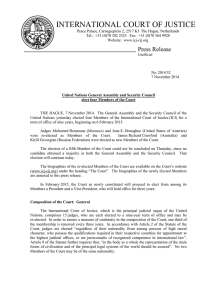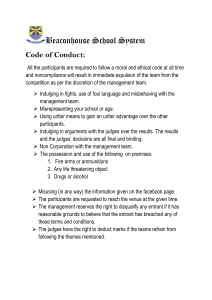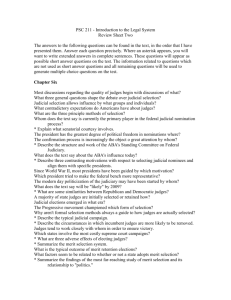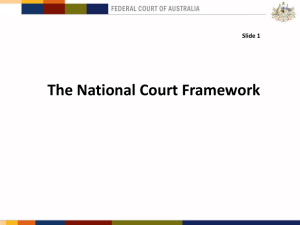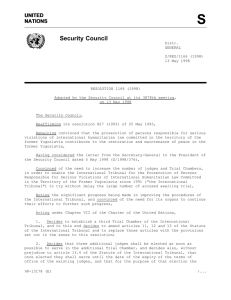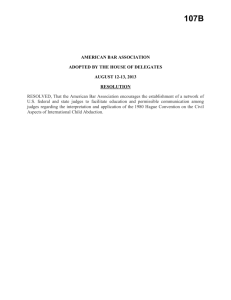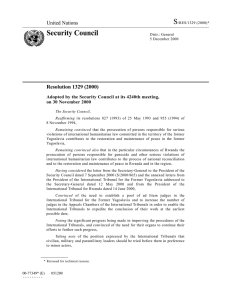Election of members of Chamber of Summary Procedure, the
advertisement
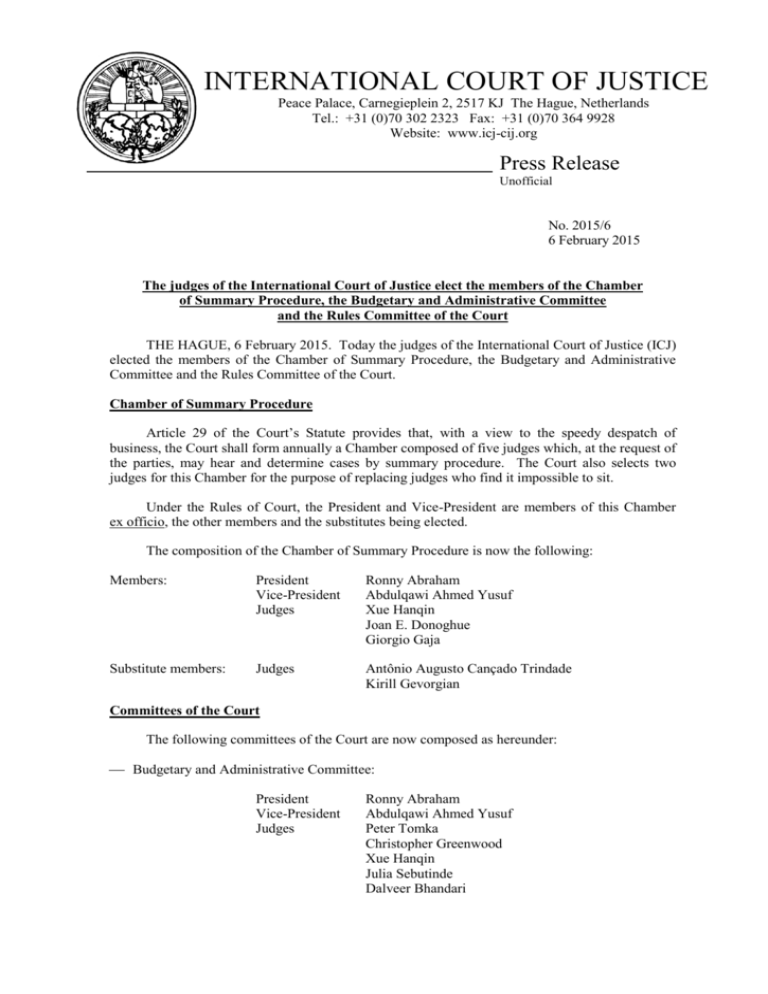
INTERNATIONAL COURT OF JUSTICE Peace Palace, Carnegieplein 2, 2517 KJ The Hague, Netherlands Tel.: +31 (0)70 302 2323 Fax: +31 (0)70 364 9928 Website: www.icj-cij.org Press Release Unofficial No. 2015/6 6 February 2015 The judges of the International Court of Justice elect the members of the Chamber of Summary Procedure, the Budgetary and Administrative Committee and the Rules Committee of the Court THE HAGUE, 6 February 2015. Today the judges of the International Court of Justice (ICJ) elected the members of the Chamber of Summary Procedure, the Budgetary and Administrative Committee and the Rules Committee of the Court. Chamber of Summary Procedure Article 29 of the Court’s Statute provides that, with a view to the speedy despatch of business, the Court shall form annually a Chamber composed of five judges which, at the request of the parties, may hear and determine cases by summary procedure. The Court also selects two judges for this Chamber for the purpose of replacing judges who find it impossible to sit. Under the Rules of Court, the President and Vice-President are members of this Chamber ex officio, the other members and the substitutes being elected. The composition of the Chamber of Summary Procedure is now the following: Members: President Vice-President Judges Ronny Abraham Abdulqawi Ahmed Yusuf Xue Hanqin Joan E. Donoghue Giorgio Gaja Substitute members: Judges Antônio Augusto Cançado Trindade Kirill Gevorgian Committees of the Court The following committees of the Court are now composed as hereunder: Budgetary and Administrative Committee: President Vice-President Judges Ronny Abraham Abdulqawi Ahmed Yusuf Peter Tomka Christopher Greenwood Xue Hanqin Julia Sebutinde Dalveer Bhandari -2 Rules Committee: Judges Hisashi Owada Antônio Augusto Cançado Trindade Joan E. Donoghue Giorgio Gaja Patrick Lipton Robinson James Richard Crawford Kirill Gevorgian ___________ Note: The Court’s press releases do not constitute official documents. ___________ The International Court of Justice (ICJ) is the principal judicial organ of the United Nations. It was established by the United Nations Charter in June 1945 and began its activities in April 1946. The seat of the Court is at the Peace Palace in The Hague (Netherlands). Of the six principal organs of the United Nations, it is the only one not located in New York. The Court has a twofold role: first, to settle, in accordance with international law, legal disputes submitted to it by States (its judgments have binding force and are without appeal for the parties concerned); and, second, to give advisory opinions on legal questions referred to it by duly authorized United Nations organs and agencies of the system. The Court is composed of 15 judges elected for a nine-year term by the General Assembly and the Security Council of the United Nations. Independent of the United Nations Secretariat, it is assisted by a Registry, its own international secretariat, whose activities are both judicial and diplomatic, as well as administrative. The official languages of the Court are French and English. Also known as the “World Court”, it is the only court of a universal character with general jurisdiction. The ICJ, a court open only to States for contentious proceedings, and to certain organs and institutions of the United Nations system for advisory proceedings, should not be confused with the other mostly criminal judicial institutions based in The Hague and adjacent areas, such as the International Criminal Tribunal for the former Yugoslavia (ICTY, an ad hoc court created by the Security Council), the International Criminal Court (ICC, the first permanent international criminal court, established by treaty, which does not belong to the United Nations system), the Special Tribunal for Lebanon (STL, an independent judicial body composed of Lebanese and international judges, which is not a United Nations tribunal and does not form part of the Lebanese judicial system), or the Permanent Court of Arbitration (PCA, an independent institution which assists in the establishment of arbitral tribunals and facilitates their work, in accordance with the Hague Convention of 1899). ___________ Information Department: Mr. Andrey Poskakukhin, First Secretary of the Court, Head of Department (+31 (0)70 302 2336) Mr. Boris Heim, Information Officer (+31 (0)70 302 2337) Ms Joanne Moore, Associate Information Officer (+31 (0)70 302 2394) Ms Genoveva Madurga, Administrative Assistant (+31 (0)70 302 2396


